My Life in Neret and Pemberton
By George Germanchev
With thanks to Lucy Rose
 Printable
Version
Printable
Version
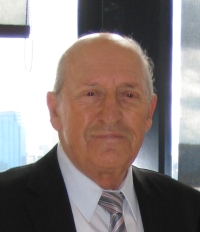 It's
the early hours of Tuesday December 6th. It has been a hot, sticky night
and I'm unable to sleep, so have decided to do something I have been
putting off for some time; that is to try and record part of my life's
history. It was never my intention to do so, but a year or two ago Vicki's
family gave me a book for my birthday entitled "Dear Grandad, from
you, to me", and inside it has headings such as: "tell me
about the place you were born", "what were your earliest memories",
"parents names, dates of birth, stories about them" etc. That
has prompted me to do something about it, and since I have had limited
schooling, and my writing is a bit shaky, I thought this might be the
better option - to record this story orally.
It's
the early hours of Tuesday December 6th. It has been a hot, sticky night
and I'm unable to sleep, so have decided to do something I have been
putting off for some time; that is to try and record part of my life's
history. It was never my intention to do so, but a year or two ago Vicki's
family gave me a book for my birthday entitled "Dear Grandad, from
you, to me", and inside it has headings such as: "tell me
about the place you were born", "what were your earliest memories",
"parents names, dates of birth, stories about them" etc. That
has prompted me to do something about it, and since I have had limited
schooling, and my writing is a bit shaky, I thought this might be the
better option - to record this story orally.
I was born in Neret, Macedonia, a village also known as Polipotamos,
which was the Greek version. Through most of this story there will be
two versions of village names. I was born to Sofka and Kuzo Germanchev,
known in Greek as Germantsos, and English as Germantse or Germanche.
Sofka, my Mum, originally came from a nearby village called Bapchor,
as I remember it, about a day's walk.
I was born at our home in the village of Neret, sometime in July 1936.
In the villages, you had a room where you could house your animals,
something like a stable. This was the place where my Mum brought me
into the world. I remember once hearing a story that Dad was out and
Mum had to call for help during my birth. I had a grandparent, my grandmother
(Dad's mother). I can't remember my Grandad, as I believe he had passed
away before I was born. Baba would have been there helping Mum. I also
had grandparents in Bapchor - I will talk about them later on.
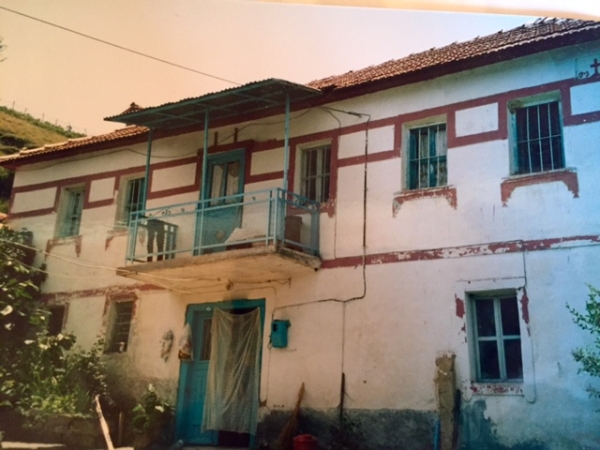
The Germanchev family home in Neret.
My father first came to Australia in late 1920s, and became a British
subject. When he returned back to Macedonia (I think it was around 1932),
he wed my mother. I was born, as I said, sometime in July, 1936. There
were no dates, no calendars, no birth certificates, so someone took
a stab in the dark and put it down as the 9th of July. For convenience,
we've stuck with that ever since. I believe things went in seasons,
and my Aunty used to tell me it was that season, and July seemed to
be about right, so I am 75 years of age at the time of recording this.
In early 1937, when I was about 6-8 months old, my father returned back
to Australia. The plan was for Mother and I to follow him out when the
documentation could be arranged. It somehow got delayed, and before
long World War II broke out in Europe. That limited transportation of
migrants from Europe to Australia. It wasn't until 1948, over ten years
later, we were finally able to get the right documentation and papers,
and Dad could afford to pay for our passage. We finally set sail for
Australia sometime in late 1948. I believe it must have been December,
as we arrived at Fremantle on the 5th of January 1949. By then, I was
12 and a half years old, and I saw my father for the first time (since
being a young baby) on that day, the 5th January 1949.
Up until then, I was brought up by my mother on her own, as were many
other children of my era. A lot of Macedonian men had dispersed to many
parts of the world to work and try and send some sort of income home
to their families. I'm not sure how that worked, as there were no banks
- maybe money was sent by mail, which was very sparse, but we somehow
survived.
My earliest memories are of the place where I was born. Neret was
a beautiful hillside village with a river running through the middle.
About halfway through the town, in the centre of the village, there
was a village square where there used to be gatherings. That's where
they had dances, and we as kids used to sit up on the hill and watch
all this, and all sorts of activities. The church was nearby. Neret
was very pretty. It had poplar trees on the riverbanks, right through
town, which really make the countryside look outstanding.
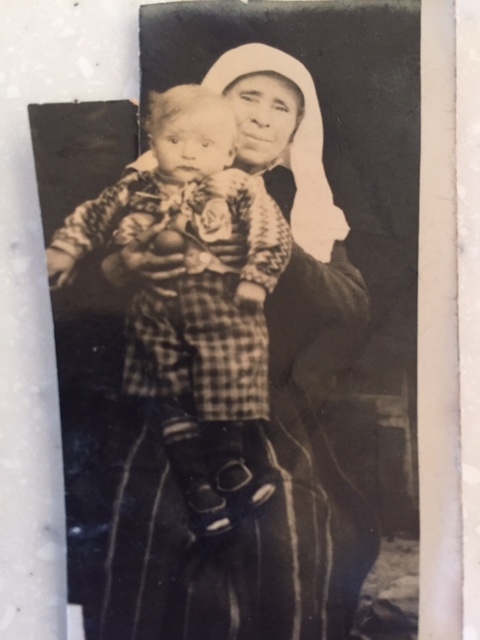
George Germanchev as a baby with his grandmother, Vasilitsa.
We lived at the edge of town, and the river was just down below us.
I used to spend many hours at the river, with other kids, playing, hopping
across it on rocks. The river was a big part of our lives. There used
to be a flourmill above our place, and I spent countless hours looking
at water turning the pedal wheel, in turn turning some huge stone wheels,
grinding wheat into flour. I think the way the payment was conducted
was that you would take your bags of wheat, and they would keep so many
as the payment for grinding the rest of your wheat. We used to grow
vegetables in the gardens. We didn't grow wheat, so Mum grew cabbage,
onions, leeks, garlic, strawberries, and beans, and they were what we
lived off. We would buy the wheat or exchange some vegetables for the
wheat and get the wheat ground.
We lived on very little, but we survived. It must have been hard, but
good management by Mum and other women in the same situation as her,
with their husbands away, as they brought up all the kids by themselves.
This is something that has stuck in my mind. Although I think I have
adapted very well to Australia, and I love Australia as my home, it's
hard to let go of your place of birth. So when Vicki and Paul, and then
later Vicki and some of the kids went back to visit Neret, it really
meant a lot to me, and I hope they got some satisfaction out of that
as well.
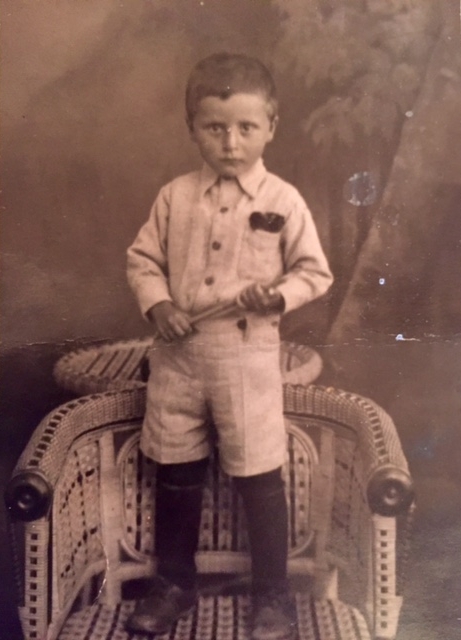
George as a young boy.
One of the other things that stuck in my mind was harvesting of the
wheat. It was all done by hand, and there would be a row of people with
sickles all working in cohesion. The wheat there grew a lot taller than
it does here, and when they finished cutting it they would stack it
together with stalks down the bottom, like a pyramid, to dry. When it
dried they would thrash it - by that I mean they would get handfuls
of it and just beat it on the ground. The seed would fall off and the
other stuff became straw for the animals in winter. That really left
an impression on me, because it was such a lot of hard work, but it
was also spectacular because when it would finish drying, and after
the thrashing, then they would sieve the wheat. For a start they would
throw it up in the air then as it fell down the wind would take out
the skin of the wheat, then they would sieve it and bag it and then
get it milled. The hay cutting was equally as spectacular, but the men
did this. They would work in rows, and I would watch them as they would
cut the hay, then they would all stop and have a drink of water. They
had a sharpening stone on their belts, they would give the saw a rub
about every ten minutes and away they would go again.
In the village, not far from us, lived Aunty Ristana Mechkarov (Metskaris
in Greek), my father's sister. She had four children, who were my first
cousins - two girls and two boys. Jim, the older of the two boys, stepped
on a mine in 1948, and was killed outright. That was a very sad chapter
in our lives, to lose someone so close and that we knew so well. The
other three are now here in Australia. Tom and Jim Mechkarov and I were
very close. They used to spend a lot of time in our house. We used to
fight, we used to play, we used to wrestle, we used to cry - the things
kids would do. Tom is now in Perth with a family of his own and has
done very well in business, and we catch up occasionally.
The only person that was lost in our family before Jim was my Baba/Nanna,
and she died when I was very, very young, I can just remember it. That
was possibly one of my earliest memories. Mum was out tending to the
fields and Baba was laying on the floor. She asked me to come and lay
with her and she cradled me. When Mum came home Baba was dead and I
was still in her arms.
I mentioned Mum was out tending the fields. The fields were small holdings
of gardens outside the village. You had your yard within your home,
and you couldn't grow much there, so you had to look for water. We had
a block at each end of the town, possibly an hour's walk either way.
Those blocks used to be our vegetable gardens, and that's what we lived
on. We had a donkey and a dog. The donkey was a man's best friend in
those early years -they were your tractor, your form of transportation,
and also your friend. Donkeys are very strong, intelligent and loyal
beasts, and this was well known when they called them the "beast
of the burden". I remember our donkey well - I used to help Mum
cart chook manure out to these gardens, and it would carry two heavy
bags of manure with me on top, and Mum would be leading it. He had to
be put away at night, in the stable. You wouldn't leave an animal outside
for fear of wolves getting to them. Our dog's name was Sharko, as I
recall he was a type of husky. We used to tie up our dog during the
day, and let him off at night. One night he didn't return. We think
the wolves got him. I missed him a lot and for days on end I cried about
him - he was my pet, my mate.
Life was hard, but it was also fun growing up. We didn't have much to
eat, but we survived somehow. We weren't the only ones in that position
- I think most of Europe was in the same situation. In our gardens,
we used to grow strawberries - almost commercially. In every house,
in the yard, we would have a wood-fired oven, and Mum used to make bread
in it. We also used to roast pumpkins and things in there. Roasted pumpkin
in a wood-fired oven used to be really nice. I recall we used to have
a huge storage box, because in Winter you couldn't go outside and make
the bread. So everyone used to make the bread (probably in late Autumn)
and have enough bread stored away for the Winter months. This was if
you were lucky enough to have flour.
Mum seemed to manage - she was very hardworking, she used to be out
every day gathering wood and tending to the garden, and she was also
a beautiful knitter. She used to knit for other people and get payment
in the form of food for her work
.
In the village there was a church and a school. We used to attend to
church most Sundays - it was a beautiful old building.
The school was very rarely used as a school, because it was occupied
during the war at various times by both sides of the conflict. I can
only remember going to school for very few days, and there we were taught
Greek, not Macedonian. There was no Macedonian schooling; I don't remember
any alphabet in Macedonian, only our dialogue. I had to walk to school
from one end of the village to the other. Mum must have scraped and
saved to have bought me a pair of shoes, and they looked a bit like
what modern day Dunlop tennis shoes look like - just a very flat sole.
She would have worked hard and saved a lot to get them for me, but I
refused to wear them because they were white and I thought they would
make me look like a girl. I cried and cried, but Mum insisted I wear
them, so I put them on and walked a couple of hundred metres on the
way to school, then took them off and hid them, and then put them back
on on the way home, just to please Mum.
My other recollection of the school was of one particular night during
the period after the Second World War had finished, when there was a
civil war going on in Macedonia between the Greeks and the Partisans.
We were on the edge of the village, and the school was at the other
end. The school was occupied by some soldiers, and I'm not sure whether
they were Greeks or Partisans. On this particular night there was a
loud knocking at the door. We were petrified, Mum and I. We had a cellar
- Mum hid me there and went and opened the door, and this soldier just
stormed in. After a while Mum got me up from the cellar. I saw big sub-machine
guns and rifles there, and I couldn't stop looking at them. Anyway,
they wanted to go to the school, and they needed someone to lead them
there. So they took me. It was in the middle of the night of course.
I remember it well, Mum howled and begged for them not to take me, but
they took me anyway. They made me walk ahead of them and lead them to
the school. This took some time in the dark, and it was a long walk.
I would have been only six or seven, maybe a bit older. I'm sure Mum
thought she'd seen me for the last time. I was walking along and for
some reason thought I'd better start whistling, because when we got
to the school I didn't want the soldiers to shoot at me, so I thought
I'd better make some noise. Anyway, I never got shot, and they happened
to be on the same side - (the people occupying the school and the soldiers
that were with me). So they got together and let me go, and off I walked
back home. A couple of hours later, Mum kept hugging me and kissing
me and never let me go for the rest of the night. It must have been
very stressful for her. For me it was just something I was asked to
do, and I couldn't get out of it - anyway it all turned out okay in
the end.
We worked and played, we lived from day to day, from daylight to darkness.
At nightfall the light was provided by kerosene lamps, and the cooking
was done in the kitchen-come-bedroom. Our home consisted of two rooms
down below - one was the stable, the other was the kitchen and living
room, and two rooms upstairs - one where Mum and I used to sleep. Up
the top of the stairs there was a picture of the Virgin Mary. We used
to ask for her blessing every time we'd walk up the stairs. Down below
under the stairs was storage for the water. The water had to be carted
from a pipe spring not far from our place. That spring used to be the
meeting place for everyone. The water used to be carted in containers
and stored in quite big jugs under the stairs. Because the water came
from the spring, it was beautiful, fresh, cool water.
In Bapchor I had my grandparents' (my Mum's parents), and Mum's siblings.
Bapchor was about a day's walk. I remember my Uncle Chris came to Neret
and took me back to Bapchor on his horse when I was very little. Approximately
halfway there he stopped to fill the canteen with water. The horse had
a drink, and I was still mounted. The horse bolted, and I hung on for
dear life. I was eventually thrown off, but the horse stopped nearby.
Uncle Chris eventually caught up to us and we continued on with the
journey to Bapchor, where I met my grandparents and all my cousins.
They were the Koios's, who are located in Perth now. I am very close
with my Bapchor cousins. As I was an only child, my Koios cousins meant
a lot to me, and still do, although we don't see nearly enough of each
other and some have passed on.
There were no clocks, or any timepiece, so we weren't aware of dates
or times. We just made ends meet and lived day to day. It wasn't until
I was about eight or nine years old, while the civil war was still going
on, that my Mother's home village of Bapchor was bombed out. This was
a very sad chapter. The people had to evacuate and we thought our village,
Neret, would meet the same fate, so we all relocated. We went to the
Greek section - we had some relatives there in a place called Lerin,
or Florina as we now know it. A lot of the Bapchorians went north and
finished up in Czechoslovakia, and families were separated.
When we moved to Lerin, we loaded everything on our poor little donkey.
We had distant relatives that we went to live with. We had to abandon
our home and everything that went with it to start a new life in Lerin,
the Greek part of Macedonia. It was occupied by Greek soldiers, Greek
police, Greek schools, everything Greek. I commenced my Greek schooling
there. From where we were living it wasn't very far. This was my first
attempt at serious schooling. I went to school there for about two years.
Each morning, as the bombing was still going on, I would wake up and
wonder if the school was still standing - sometimes I would wish it
wasn't. I think every child has moments like that, where you get sick
of the routine of school. I had to learn Greek, and while Greek and
Macedonian seem to have some of the same customs, the languages are
as far away from each other as Chinese and English. So it was very difficult
to learn to speak Greek, then write and read Greek, but I was a reasonably
fast learner and I coped well. By the time I came to Australia I could
read, write and speak Greek fluently, but now - some 60 years on, because
I haven't spoken Greek to anyone, I have just about forgotten everything
- not that it worries me much. Naturally our family speaks Macedonian
when we get together with cousins, aunts and uncles.
The people we lived with in Lerin had fields out of town, and they
had two bullocks and a cart. They used to use these as transport to
cart manure out to the fields and bring stuff back in. They taught me
how to drive the bullocks with the cart, and that was my job when I
wasn't at school. I remember that fondly, because we'd do it together
with other kids and everybody was in the same situation. I remember
one occasion we had to cross a river. Although it was knee deep and
the bullock teams would usually drag the cart through comfortably, on
occasions the snow would melt in the mountains, and the rivers would
flood without warning. There were trees and logs and things floating
down there, and it was a very dangerous situation. You had to stay on
the other side of the river until it dropped off, which might take days.
I remember unhitching the cart and hopping on one of the bullocks. He
swam across, and the other one followed. We got safely across, and I
rode the bullock back to Lerin. It was to everyone's surprise when we
got home and the rest of the kids were still stuck on the other side.
I don't know what made me take that chance or think of doing that, but
the bullocks seemed to know where home was and they got me home safely.
This story about the bullocks reminds me of another early episode
in my life, back at the village. From a very early age, I can remember
that a lot of us kids used to tend to the herds. The herds consisted
of cattle, goats and a few sheep. Most of the animals were housed in
the confinements of the homes, or in the yards, so each day from dawn
to dusk in the three seasons of Spring, Summer and Autumn, we the kids
would tend to the herds - that is take them out to the fields and make
sure they didn't stray into people's gardens, and then bring them home
in the evening and take them to their respective homes. I was in charge
of a small herd of cattle that belonged to some people not far from
us, and I used to go and get them in the morning and take them out all
day. We would all be together, and it was a good time for the kids.
I can't remember what we did for food - our Mothers must have packed
something for us, but I can remember just spending days at waterholes
with the cattle just grazing. Amongst my herd there were two crazy cows
that used to spook at anything. I used to spend hours chasing them,
crying, beating the ground, getting up, and chasing them again to bring
them back. On this particular day, they were at a waterhole and there
was a bee-type insect that used to sting them. Two of them bolted, and
I ran after them, cried, and brought them back some time later. To make
sure they wouldn't take off again, I tied their tails together. I did
an old Granny knot - somehow managed to maneuver them together side
by side and tie their tails together. Then the next time one of them
got bit, it took off. I remember we were on quite a steep hill, and
it went downhill dragging the other one behind, and snapping its tail
right off at the butt. Eventually I caught up with them, undid the broken
piece of tail - it had severed at the knuckle, there wasn't much blood.
I stuck it inside my shirt and we went home. I normally would take the
cattle back to their owners and then walk back home, but as we had to
go past our house, I let them go on their own - I was petrified as to
how this was going to turn out. I didn't tell Mum anything, went to
bed, got off to sleep ok, because I would have been tired. In the morning,
I heard a commotion. The owners of the cattle were in the yard yelling
at Mum and wanting answers, and I woke up and still had the tail tucked
inside my shirt. I then had to explain to Mum what had happened. Needless
to say, I lost my job. That deprived our payments for the year, which
was one bag of wheat for looking after the cattle. It's humorous now,
but back then it was quite a stressful episode.
During the war, when we were doing all these things out in the field,
we also had some good times. I can remember laying on our backs looking
at the skies. We were just mountain kids, we knew nothing of life outside
of the village, and we could hear the droning of planes. We didn't know
what a plane looked like until then. We would be lying on our backs
and there would be a formation of planes - you would hear them long
before you could see them. In summer time in Macedonia it was just clear
blue skies, and then you could see the sky black with formations of
planes going one way, then they would return, and we would hear the
droning and the noise, and again look up and lay on our backs and look
at them -that was the best way to see them. On other occasions, they
would go the other way, and return. It wasn't until I started to get
an education in Australia when I learnt some history and knew more about
the war, that I realized that it must have been the English and the
Germans.
During the German occupation, the Germans came through Macedonia, but
I don't remember anything bad about that. They were the frontline soldiers,
and they left bread with us in exchange for strawberries, and then just
moved on. It wasn't the SS, who had the bad reputation.
Occasionally I used to be by myself, and I remember walking out of
the village going one way. I must have been going to one of the two
blocks where Mum was tending to the garden, and on the other side of
the river there was a young couple. The girl was known to us, I think
her parents might have been my Godparents. I must have been giving this
young couple a bit of lip, as she called me over, or they coaxed me
to go across, and the young fella with her took to me. They lured me
to go across and then I remember he picked me up above his head and
then slammed me to the ground several times and left me there. I was
battered and bruised, and in a sad state, but I didn't have anything
broken so I limped and crawled home. When Mum saw me she was angry and
cried, but there was very little she could do. I was hurt, and I limped
for a long time, but anyway I came good. Years later when we were in
Australia, while Mum was still alive in Manjimup, the subject came up,
and I found out that that fellow was living in Melbourne. I had it in
my head that I wanted revenge, so I was determined to go to Melbourne
and sort him out! But Mum begged me not to do it and so I tried to forget
all about it.
So during the wars, both the Second World War and the Civil War, we
could hear the never-ending gunfire in the distance, and sometimes quite
close by - the cannons, and the constant chatter of machine guns. We
just seemed to get used to it; it just became part of the background
noise, but when you think about what it did to the people at the other
end of the firing line, it's just a really sad episode of the war.
When Bapchor was bombed, my Koios cousins and my Marginis cousins fled
north to Hungary and Czechoslovakia. Because of the Iron Curtain, they
weren't able to come to Australia until about 1954, about five years
after we came. People who went down south, into the Greek sector, seemed
to be able to come to Australia much earlier. In Bapchor my Mother had
her sister, Aunty Ristana Marginis, my Uncle Chris (Dedo Risto) and
all my cousins. Uncle Nick and Uncle Norm were in Australia. Uncle Norm,
when I came to know him, was a lovely, gentle man, who worked on the
farm at Yanmah on his own. For a period we lived at Donnelly River Mill
and I used to pushbike to him on weekends and help him with the tobacco
plantation and on his potato patch. All of his children came over and
they all eventually relocated to Perth.
In 1948, Mum and I were finally able to come to Australia, along with
many others. We assembled at different areas in Lerin and a bus picked
us up. We proceeded to travel down to Salonika (or Thessaloniki as it
is known) to board a small merchant ship to take us down to a port near
Athens. We eventually got to Salonika, to the port. Salonika was the
Macedonian capital - there is a magnificent statue of Alexander the
Great and a Macedonian museum, which is well worth visiting for any
descendents of any Macedonian family. Bernice and I visited this in
1985, and it was quite an experience.
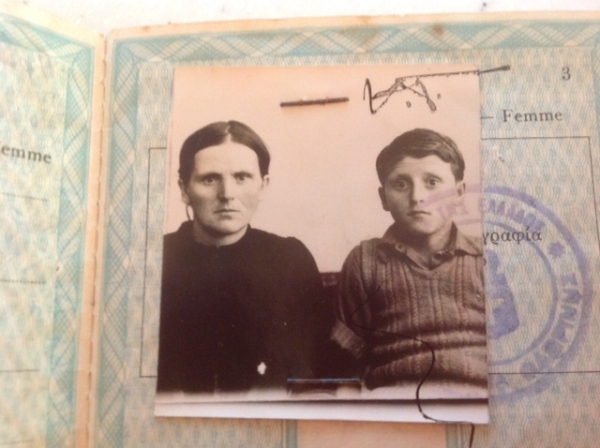
A passport photograph of George and his mother Sofka.
As we got into view of Salonika, I remember seeing the port, and it
was my first ever glimpse, at age 12, of any sea or ocean. We stayed
overnight and boarded this small merchant ship and proceeded down to
Piraeus, then to Athens for a couple of days. We took some photos in
front of the Greek Royal Palace. From there we boarded another ship
and went to Cyprus. At Cyprus we disembarked just on dark and hopped
in two or three taxis, which seemed to drive forever to get us to the
place we were staying. I remember it was a double storey building. When
we got up in the morning, we thought it must have been a long way to
where we were staying, but we could see the wharf where we got off the
ship. The Cyprian taxi driver had driven us all around the place on
the pretense that it was a long way. Nobody had much money, and the
little bit we had was certainly wasted on this trip - we could have
walked to our rooms if we had known where they were.
From Cyprus we had to go to Port Said to hop on the ocean liner that
brought us over to Australia. It was a Yugoslavian ship called "Partizanka"
and I remember we had Christmas on the ship. We berthed at Fremantle
on the 5th of January 1949.
Onboard the ship were some people from my village - the Karafilis'
(Paul and Jim), their father was in the same situation as mine, he had
been out here earlier; Stan and George Stoiche, and quite a lot of people.
It was during this trip that I became very close with my lifelong friend
George Eftos. Dad had a half interest in a café in Collie with
his cousin, and George Eftos' father had an interest with his brother.
They had a daughter called Leta and she came with us. So there was Mrs
Eftos, my mother, Leta and George and I. The three of us kids finished
up living in Collie.
In Fremantle, we pulled up, the ship tied up, and there was the usual
customs clearance. I then first met my father. Twelve and a half years
had gone by, so I'd missed out on that father figure for that part of
my life. Dad only lived until age 52 - he passed away in 1959, so I
only knew him for about ten years after we arrived in Australia.
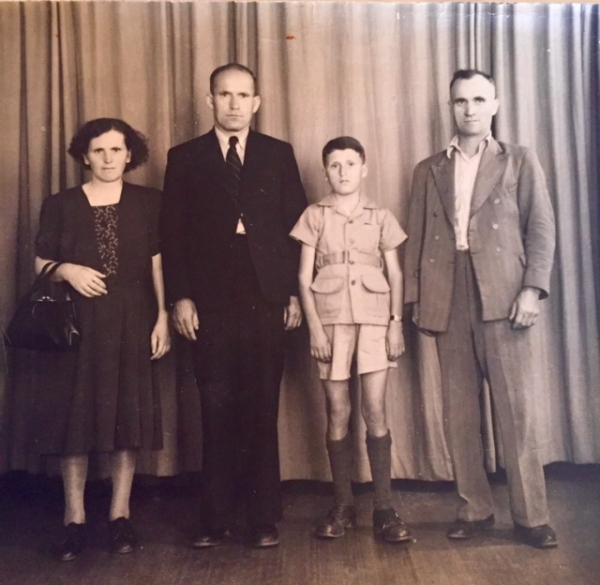
From left: George's parents Sofka and Kuzo Germanchev with George
and an unknown person who is possibly a cousin.
After we disembarked at Fremantle, and met my father, we proceeded
to Perth to stay with Aunty Slatka Milentis, second cousin of my mother.
She had a boarding house on Francis Street, and we stayed there two
or three nights. I met up with my third cousins Johnny, Tassy and Louis
Milentis. Unfortunately Louis has passed away but I still see Tassy
and Johnny on occasions.
After about two or three days in Perth, we arrived in Collie. That
was a real culture shock.
Collie to me is like my birthplace in Australia. George Eftos, Leta
and I all started school in Collie on the same day in the New Year.
I couldn't speak a word of English, so this was my second attempt at
learning a new language. George filled a void in my life and became
the brother I never had. We grew very, very close. He had an older brother,
Vic, who had come over to Australia earlier and was with his Dad. We
did a lot of things together - went to school together, fought the other
kids together, as they would gang up on us. In those days, being a foreign
kid in a Collie school was fairly hard, so before I could learn English
I had to learn how to fight. But we survived, and occasionally I go
back to Collie and catch up with some of the friends I made at the Collie
school.
We didn't stay in Collie all that long. Dad and his cousin split up
and left the cafe and we relocated to Donnelly River Mill, which was
close to Manjimup. Dad got a job there with the state saw mill and I
had to catch the bus to the Yornup school. On the first day of school
I went in to Bridgetown to be told that I should be at Yornup. So I'd
ended up going straight past Yornup and had to hang around at the school
in Bridgetown for the rest of the day. The next day it was sorted out
and I started school at Yornup. It was then on weekends, as I mentioned
earlier, that I used to go to Yanmah to visit Uncle Norm, and that was
a fair distance on a pushbike. It used to take me a couple of hours,
on the gravel roads. I learned to ride a bike in Collie, and I can still
recall the scraped knees and palms and bits of skin hanging off everywhere
when I was first learning to ride a bike. Where we were living in Collie,
the café was downstairs and upstairs were the living quarters.
It was quite hilly, and George used to live on the other side of town
so I used to bike over and pick George up and dink, and sometimes we'd
come off. We hit the train once at the crossing - how we survived I
don't know. George took the impact because I had him on the bar in front
of me. We used to go swimming in the Collie River; it was a great time.
When we left Collie, George and his parents went to Perth. I still
class George as my dearest friend. He did very well for himself in business
in Perth, where he still lives with his wife, Vicki. They have a property
in Yanmah and they come down quite regularly. I will forever value his
friendship. When I meet with George, it's not the casual handshake;
rather, we hug and unashamedly kiss each other. It's just fantastic
to have a friend like George that I grew up together with.
After about 18 months of schooling in Collie and about two years in
Yornup, I started an apprenticeship in Manjimup at Warren Motors, which
recently closed. That's where I met Vic Kordic. Mum and Dad were still
living at Donnelly River Mill, and I was living in a single man's hut
just out of Manjimup, which used to be an old tobacco plantation. Mr
and Mrs Louis Rumanos were related to the Germanche side somehow, so
I used to board there. I remember I commenced on the wage of 40 shillings
a week, and I was paying 45 shillings a week (equivalent to about $2.50)
board, so I made up the shortfall by doing odd jobs on weekends, chopping
wood for people, and anything I could do to keep my head above water.
I worked at Warren Motors for some time, where there was a gentlemen
named Fred Stewart, who partly owned Warren Motors with some people
from Bunbury and Donnybrook. Fred eventually broke away from there and
I went to work for him at a little workshop just near Rae Park. Vic
Kordic, whom I'd met at Warren Motors, eventually started a business
of his own and he offered me a job there. Vic had a good business head,
he was a mechanic with a terrific imagination, and was one of nature's
gentlemen. I owe a lot to Vic. Just to fast forward a little, when I
married Bernice in 1959, Vic gave us a washing machine as a wedding
present, and that, in those days was, I don't know how to describe it…
A wedding present would usually be a matter of shillings and pence,
but a washing machine was just a godsend for Bernice. Vic was a very
astute and resourceful businessman. He founded Dingup Brickworks, he
had a car agency, and his last venture, which is still well recognized,
is Chestnut Grove winery, now run by his son. Vic was a very generous
man. He also started a safety-driving program at Manjimup High School.
He sadly passed away about seven or eight years ago.
I will go back a little, back to my only schooling in Australia, which
was very short lived, because it was an awkward time for me. I came
here at twelve and a half years of age without being able to speak the
language, and that put me back a bit. As I said earlier, formal education
was out of the question because of my age, so I went to school for a
short while at Collie and then at Yornup, but I think it was sort of
primary. So at about age 16 I left school to commence my apprenticeship
as a mechanic. When I was at school, I started playing a bit of sport.
I played cricket, and started to kick the footy around a bit. In Yornup
I was the only representative from Yornup at the Bridgetown school sports.
I had to run, jump, do the lot. I was a one-man team, and at the end
of that day I was totally exhausted, but it was good fun. I played a
bit of footy. I started off with Imperials, then crossed over to Jardee
where some of my Manjimup mates were playing and asked me to join them.
That was good fun. We used to run from Manjimup to Jardee for training,
then run home back to Manjimup. I played a couple of years for Jardee,
but then the Warren league became the Lower South West league, so Tigers
and Jardee amalgamated. So I played with Tigers for a year or so.
I was just an ordinary footballer - other people said I could play
at a higher level, but a severe knee injury put a stop to that. So when
I later came to Pemberton in 1961, I wasn't playing football, but the
Southerners club talked me into playing. I played for a couple of years
here. I then turned my hand to coaching colts, and that was a terrific
period of my life, because I got to know some very good young kids that
I coached, and a couple of them went on to play league football in Perth.
I remain friends with a lot of those boys, who are approximately ten
years younger than me.
A lot of them still live around here, but one of them, Jim Timms, one
of my dearest friends, comes down from Binningup and we go to the Donnelly
and he helps me at the Donnelly a lot. Others, Matthew Della Franca,
John Omodei and so on, are all still my good mates.
After I finished coaching I was on the committee for a few years, then
I was vice-president, then eventually president. During that period
we had a lot of success as a club. I instigated a building program and
a loan from the shire, and we built the Southerners' clubrooms. Prior
to that, we had nowhere to call home as a club. With the new Southerners'
clubrooms all the players, or anyone that came to the district, felt
as though they had a home to go to. Southerners have had terrific success
over the years - we've won 18 premierships to this point, about 26 in
the seconds and 18 or 19 in colts. I have seen most of these premierships,
and been known to celebrate heavily at a few of them. Southerners was,
and still is, a good part of my life. I was bestowed a life membership
in 1970 for services to the club. I was very, very proud to receive
that, and believe I was one of the youngest life members, as I was about
34. The club treats me with a lot of respect, and still asks Bernice
and I to most functions they have, and we try to attend as many games
as we possibly can.
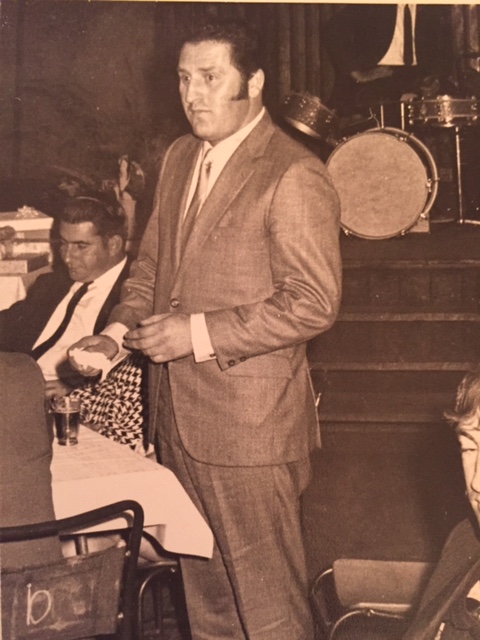
George whilst President of Southerners Football Club, Pemberton,
WA.
Back to Manjimup, where I was working at Warren Motors. It was there
that I met Bernice. Bernice at the time was working at Shad's Drapery
and she and her friend Beverley Masters were inseparable. They were
the best of mates, and if you saw one you always had to see the other.
Bernice had and still has the gift to talk to all people, from all walks
of life, and in those early days there were a lot of Macedonians in
Manjimup and Bernice and Beverley made them feel quite welcome. I was
included in that company, and a great value Bernice has is that she
treats everybody equally. Everybody with Bernice is on equal footing,
no matter where you come from and what your status is in life. Actually,
that attracted me to Bernice very much. Not only was she such a lovely
person, she was also and still is good looking. We dated for a long
time, just used to see each other at lunchtime and occasionally go to
a dance or something. Sometimes Beverley would come with us. Eventually
we got engaged and in 1959 we got married. It was one of our biggest
days of our lives, and from there our love just grew together.
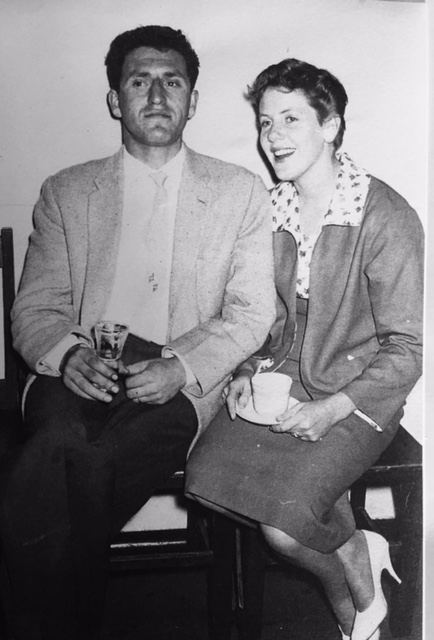
George and Bernice as a young couple.
When Bernice and I got married in Manjimup, we had a very simple ceremony
in the Church of England; then had a small gathering at the Manjimup
Hotel with close friends and family. From there, we went to the Buegge
farm, where it was an open invitation wedding. We didn't actually send
out invitations to a lot of people, but lots of people came to help
us celebrate our wedding that night. It was a barbecue type affair,
and at the end of the night Bernice and I went on our honeymoon. We
took off to Rocky Gully for our first night. We arrived there after
midnight, where there were a few people waiting for us - we had a bit
of an unplanned reception there. Unbeknown to us someone had leaked
the word that we were going to be staying there, and some of the Rocky
Gully locals thought it would be a good idea to keep the bar open and
greet us when we arrived. It was actually quite funny, we wanted to
go to bed and they wanted us to stay up, but it all worked out well.
We continued on our honeymoon through the Great Southern region, then
up to Northam, then eventually to Perth for about a week. We then came
home and commenced our life as a married couple.
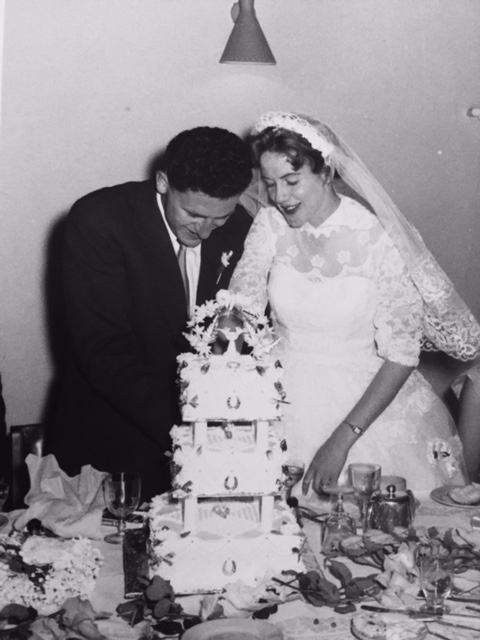
George and Bernice's wedding day.
We lived in Manjimup as a married couple from 1959 to 1961. When Vicki
was born, in April 1960, it was a great day of joy for both of us. I
was working at that stage in Bunnings' workshop just to get a bit of
heavy machinery experience, and I went to see Bernice at the hospital
at lunchtime. Of course I was in overalls and they wouldn't let me go
into the room. Anyway Vicki was a lovely little bundle of joy. She was
full of life from the word go. It was great having a child at such an
early age - I was only 23 and Bernice was 20. I'm stuck for words here,
but it was just the best part of our lives. Vicki was born at the Warren
District Hospital, and Robert was born later at the Pemberton Hospital.
When Robert was born in January 1962, in Pemberton Hospital, for me
to have a son was just fantastic. At that stage, we were enjoying Vicki's
company and she gave us a good run-around. Pemberton Hospital had a
really good doctor in old Doc Ryan and Matron McGillivray. So we were
now a complete family, a young couple with a girl and a boy, and our
life in Pemberton began.
In 1961, I was back working with Vic. He told me of an opportunity
that was coming along, and he introduced me to Bill Everett, who owned
a service station in Pemberton. He'd been leasing it to a chap who went
broke and so it was closed down. Vic thought I could reopen it and make
a go of it. So we talked it over with Bill and we became partners. He
owned the building, I was doing the work, and we shared the income.
It was hard going, and I was travelling from Manjimup to Pemberton,
working late because I was keeping the workshop and the pumps going
during the day, and if there was any field work such as milking machines
and tractors, I used to do that after I closed up the shop. So I was
coming down to Pemberton at 7am, which meant up at 6am, and quite often
getting home after 10 or 11 o'clock. We kept this up for a few months,
and we then decided we would come and live in Pemberton. Bill had a
house that he offered to us. He was another very generous chap. We worked
hard, cleaned the house up, and made Pemberton our home. The intentions
were that we would give it about five years, and if it didn't work out
I would be able to go back with Vic - that was an open offer. Bill was
a lawyer by the way, but he was running an SP bookie shop in Manjimup.
He was a terrific bloke to work with. We would do the books together,
and his wife and Bernice got on very well so we would make an evening
of doing the books on a monthly basis. After a while, I bought Bill's
share out, and I became the sole operator of the Central Service Station.
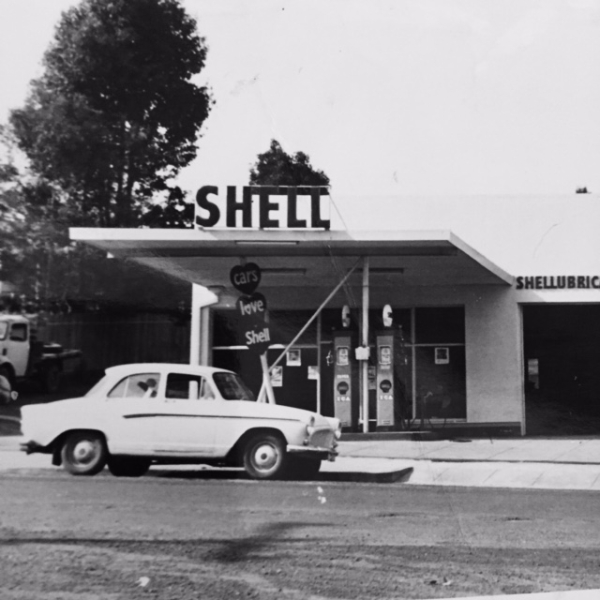
George's first business, Central Service Station, at Pemberton, WA
in the early 1960s.
It was still limited as to how much income we could make, so after
talking it over with Bernice we decided to add a café to the
service station, and it sort of became a small roadhouse. At that stage,
the public were starting to move around, so tourism was growing and
the fuel sales increased, so from there on we worked very hard and had
a reasonable income. In time, I bought the freehold from Bill, so then
it became our own service station, and we could do whatever we liked.
We worked there for 25 years, from 1961 to 1986.
It was hard work but we got to know a lot of people. A lot of our customers
still remain friends, not just Pemberton people and locals, but people
that were coming down on a regular basis from the city or other areas.
When we sold the service station we became a bit out of touch with
the public, so nowadays we don't know as many people in Pemberton as
we used to. Back then if a stranger came to town, everyone knew everyone,
and I made it my business to get to know them, and quite often that
would create business for us.
I'll go back in time once more. My father and mother moved from the
Donnelly Mill to Manjimup. As I said before, I'd been living in Manjimup
in a small single man's hut. Dad bought half an acre with a little home
on Ray Street, and we lived there for about ten years together before
Dad passed away in August 1959. So I was only with my father for ten
years, which is a void in my life I've always regretted. The other was
not having any siblings. But that changed when I met Bernice, because
immediately I had three brothers-in-law and two sisters-in-law. With
the Buegges being so family orientated, it was just terrific to be a
part of that group. They had relatives everywhere who treated me as
one of their own, and still do. It's just fantastic to be a member of
such a large family.
As I said, my father became a British subject (that is the same status
as Australian Citizens nowadays), and so because Dad was an Australian
Citizen when I was born I was half Australian anyway. In 1954 both Mum
and I officially become Australian Citizens. Mine was just an endorsement
by a person in Manjimup, Ike Doust, who was a JP, so that's how I became
a true blue.
Vicki and Robert went to school in Pemberton. Kids in those days used
to play sport 24/7. Robert always had the cricket bat in his hands.
We built our present home and moved in in 1969, and Robert made the
driveway his pitch. Kids from the neighborhood would come, put up an
empty drum as the wickets, and they would play cricket. Anything over
the fence was out. So Robert became quite a good cricketer, he played
cricket for the Manjimup High School and was an opening batsman. Robert
and Vicki both excelled in sport - Vicki was a very good hockey player,
excellent runner at school sports, Robert was a good cricketer and a
very good footballer. He won fairest and best for the club in all grades
that he played in, and he also won the Lower South West Football League
colts fairest and best. In my opinion and that of a lot of people who
were involved in the club, Robert, given the opportunity, could have
gone onto bigger and better things with his football. No doubt if he
had the opportunities and coaching programs that kids have access to
now, he could have played at the highest level. When Robert went to
Perth he had an offer to go to East Perth, but he chose to study rather
than play football and I think that was a wise choice.
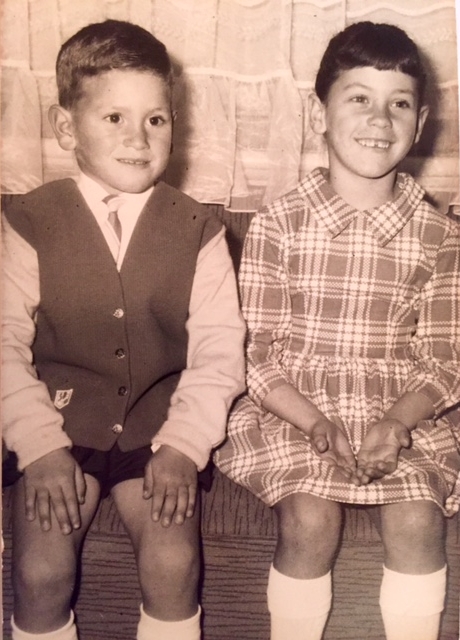
George and Bernice's two children, Robert and Vicki Germantse.
My life in Pemberton has been very rewarding. I got to meet a lot of
new people and make lots of friends. Pemberton identities like George
South and Peter Sparrow became life-long friends. I took up fishing
in a very serious way. Fishing is my passion. We had an angling club
and we used to go away once a month over the weekends. Robert used to
come, as did a lot of boys in his age group. It was just fantastic.
I still love fishing, and although I'm restricted somewhat now, I still
love to go down the Donnelly and wet a line. Peter Sparrow actually
introduced me to the Donnelly, he had a hut there called "Runamuk",
a well known hut, and he offered it to me on a couple of occasions.
I was so taken by the place that I bought a little boat and decided
I would like to build a hut down the Donnelly. A lot of friends helped
me with that, particularly Roy Okwell who suggested I build next to
him, and he would help me with the hut. He was a great friend and help
to me over the years. Anyway I built the hut, which was hard work, building
a hut out of nothing. Everything had to be taken down by boat, and it
had to be done after hours, in between work. I would go down early afternoon,
work early into the night, then come back early in the morning to start
work. But it's been well worthwhile, because the kids and some of their
friends have had terrific times down there, and I think most of our
grandchildren have been there and I'm sure they have all enjoyed it.
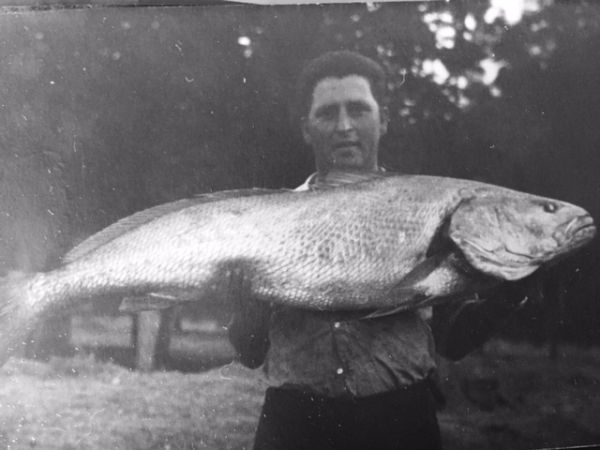
George the keen fisherman.
I would just like to add a little bit about my dear mother, who some
of the older grandchildren would remember as Baba Sofka. She was a wonderful
mother to me, brought me up when my father wasn't around, at a time
that was very, very difficult. We had very little to eat so Mum provided
all the food from the garden. Our staple diet was mainly beans and vegetables;
there was very little meat to go on the table. She made everything from
bread to beautiful Koras, a delicious Macedonian pie. Very simple, staple
foods that as a youngster you tend to tire of, but now, as I get old,
I seem to miss that flavour. I have been very lucky that Bernice has
taken up some of the Macedonian cooking, and we both enjoy that very
much, and I think Vicki and Robert are partial to it as well.
Mum was a very hard-working woman. In the early days in Neret she worked
day in day out trying to keep the household going. We had neighbours
and the Mechkarov's who weren't very far away. But her family village
was about a day's walk so we seldom went there. When we came to Australia,
Mum again tended to her garden. She wasn't very well by this time and
spent a lot of time in and out of hospitals. It was a difficult time
for all of us. On a couple of occasions Mum had to go to Perth.
We had no means of transport, so it fell on me to make some arrangements
and take Mum to Royal Perth Hospital. On one occasion I remember we
got a lift with one of the Manjimup bakers, but there was only room
for the driver and Mum in the front of the ute. I had to sit in the
tray all the way to Perth, and it was night time in June, so freezing
cold.
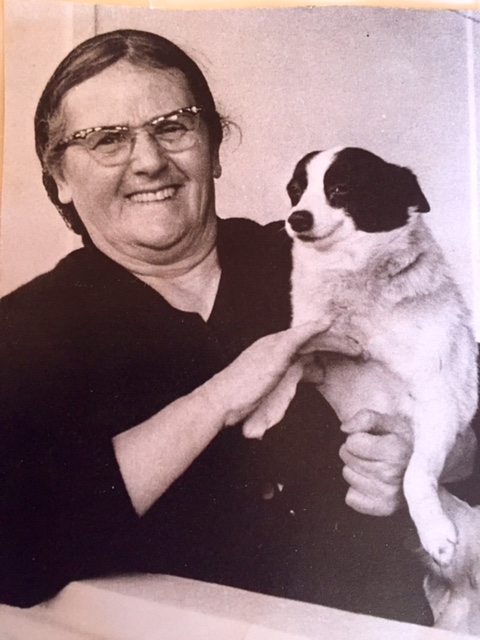
Sofka Germanchev with her much loved dog at Manjimup, WA.
When Dad passed away in 1959 and Bernice and I moved to Pemberton in
1961, Mum was left home in Manjimup on her own. One of the young Marginis
relatives moved in with her to keep her company, but it wasn't long
after that that she broke her leg and it wouldn't heal. It was then
that they found that this inherited Charcot-Marie-Tooth disease was
prevalent in the family. The broken leg wouldn't heal for about six
months, so she was sent to see a physician in Bunbury, Val Lischman,
a wonderful and recognized doctor in the South West. He stumbled onto
why the leg wouldn't heal; it was due to the nerve damage because of
the Charcot-Marie. Eventually the leg was put in plaster and it healed
superficially but she couldn't work very well. Mum went to Moonya Lodge,
and we rented out her little house. That was a drag as people weren't
always the best of tenants. There were things going wrong, so I was
in and out of there trying to fix things up, whilst trying to run a
business in Pemberton. We would try to go in and see Mum at least once
a week. After a while she had to go to the William Wing of the Manjimup
hospital, which is for the next stage in aging.
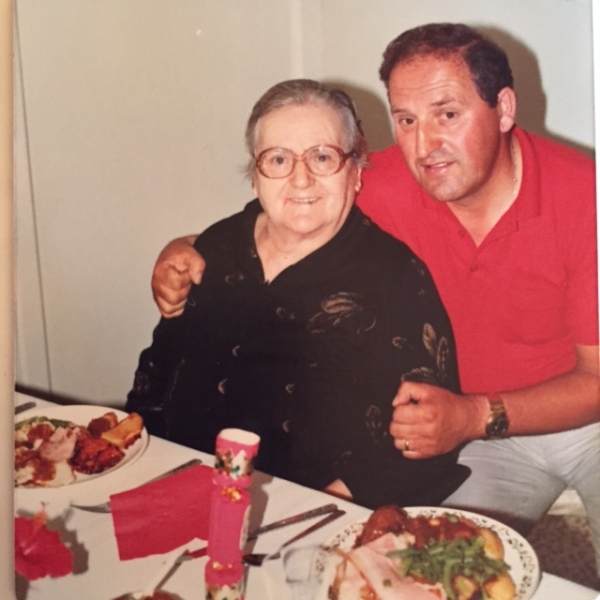
George and his much-loved mum Sofka in her later years.
Mum passed away in 1994. Bernice and I had been reluctant to go anywhere
because of her sickness, and we knew this would eventually happen, but
she hung on very well. Unfortunately when Mum did pass, we weren't here
to see her go. Vicki took responsibility and rang us - we were camping
at Warra station south of Exmouth, where we used to go for a number
of years. I was out fishing in a boat with a friend when the message
came through that she didn't have long, so we hurriedly packed up and
drove virtually all night and all the next day only to be greeted in
Geraldton by Gillian Court, one of Vicki's friends who used to be our
neighbour. Vicki had called Gillian in the hope that we would stop there,
and as we pulled up outside her house she was actually waiting for us.
Vicki had been on the phone, but must have just hung up. Gillian passed
the news onto us.
Vicki was terrific, and had been a regular visitor to the hospital,
especially when we were away. After Mum's passing we held a wake at
Vicki's and she did a fantastic job. We had a good gathering of family
and friends there to finally send Mum off.
Poor old Mum did it hard all of her life, but she did live long enough
to see what she always was hoping for - some of my grandchildren, her
great-grandchildren. Not all of you were able to meet her, but some
of you did, and I hope that you will remember her.
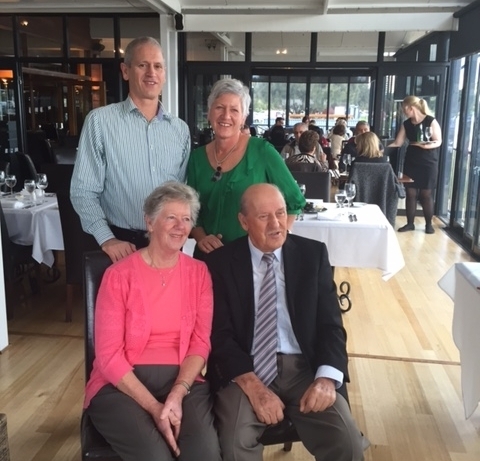
Above: Seated: Bernice & George, Standing: Robert & Vicki,
at
George's 80th Birthday, July 2016.
Below: Bernice and George with all seven grandchildren at George's
80th celebration - July 2016. Back: Hannah Germantse, Jennifer Rose,
Timothy Rose, Rachel Germantse, Claudia Germantse, Eleanor Rose, Lucy
Rose.
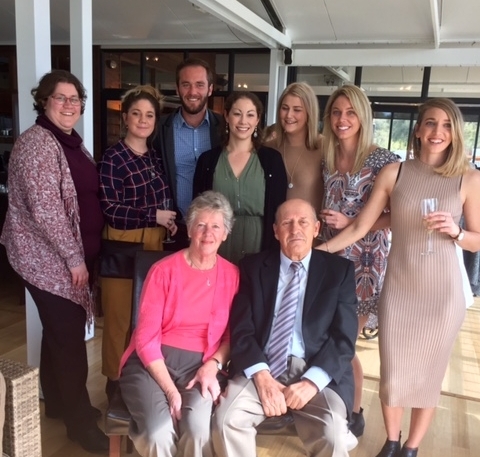
So here I am - fifty years after saying I'll only come to Pemberton
for about five years, still in Pemberton. We've made Pemberton our home
and are very lucky to stay here for the rest of our lives, content and
satisfied with life and proud of our children, Vicki and Robert, their
choices of partners Paul and Kristen, and the seven beautiful grandchildren
they have brought into the world.
I've had a couple of hiccups along the way, but with the love and devotion
and care of a good woman, I have got over that. Now I like to think
I am slowly getting old, but there is an upside to that, and that is
the pleasure of watching your grandchildren grow and blossom into adulthood.
We are very proud of what they have all achieved in their chosen careers.
I cannot find the words to describe how much I love each one of you.
I hope you all realize that.
My Life in Neret and Pemberton was recorded in 2011 and transcribed
and edited by Lucy Rose.
© George Germanchev
Published by Pollitecon Publications, 2016
Source: www.pollitecon.com

